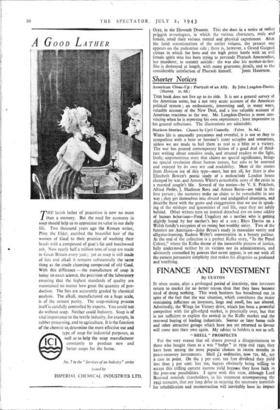Fiction Tales From Bective Bridge. By Mary Lavin. (Michael Joseph.
8s. 6d.) Isle of Saints. By E. M. Ward. (Methuen. 8s. 6d.)
Chenies. By Taffrail. (Hodder and Stoughton. 8s. 6d.) Lord of the Horizon. By Joan Grant. (Methuen. 9s. 6d.) HERALDED with a generous introduction by Lord Dunsany, Tales from Bective Bridge comes as Miss Mary Lavin's first published
book. The author is .Irish by adoption, not birth, and the ten stories all have Ireland for their background. Miss Lavin, like malty writers of the country of her choice, often carries her stories beyond the point at which an English or American author would stop: her ability to do this is evidence of her skill and the source from which she is influenced. Her talents are various, she can coin. a neat phrase, evoke atmosphere swiftly and indicate character in a few words, her sense of dialogue is excellent. The stories range through differing stratas of society ; she can write of the peasant, the small Dublin shopkeeper, the maiden lady who has come down in the world, or the well-to-do with equal ease. She has attempted a couple of experiments, but these are less successful ; • both are marred by over-writing, and A Fable is precious in the bad sense of the word: sensibility so easily becomes sentimentality when thinly employed. Love for Lovers, At Sally Gap, Lilacs, "Say Could that Lad Be I?" and Brother Boni face are good examples of her genuine ability. Everyone interested in the difficult art of the short story should make a point of reading Miss Lavin, for at her considerable best she both stimulates and entertains.
Entertaining on a more modest level is Miss E. M. Ward's Isle of Saints, which is a war-time love-story told with much charm. It has both lightness and gaiety, with feeling for character and place. The background is Wales, and since the author is something of a topographical expert, this, is done with very considerable skill. She possesses, too, a warm and generous affection for Wales and the Welsh. The holy isle is Bardsey, but the characters never visit it, though they see it from various points, and it remains for thein as a symbol throughout the book. Susan Birch, somewhat hag-ridden by an intense Mama, carelessly allows herself to get engaged to a very tiresome young clergyman. Quickly realising that she has made a stupid mistake, she breaks off the match, then suffers from feelings of guilt about the whole affair, but worse than that is the T, sense of her own irresponsibility, which she fears she has _inherited from lief, somewhat hysterical mother. Ow.ing to a variety of difficul- ties, the- Birches decide to leave their Cheshire home. They join an elderly spinster friend who is living at the Ceredigion Hotel in Aberystwyth for . an indefinite period. Here Susan- meets young Captain Mick Crozier, and they fall in love. Mrs. Birch had 41. divorced her husband when Susan was a child. He is now a famous architect and his second wife is dead. The thought of him being in the neighbourhood throws her into a series of crises of which poor Susan bears the brunt. To further trouble her romance, the .- affronted cleric turns up at the same hotel in order to give her a second chance. In the end all comes right. Miss Ward has wit, though she should restrain her sense of the absurd, for it weakens the sincerity of conception at times. Her talents are such that one would welcome a more ambitious book from her pen.
Chenies is Taffrail's first novel of the Navy in action in this war. The book is built up around Peter Chenies, commander -of the armed merchant cruiser Fonthill Abbey,' his family, friends, and some of the men who serve under him. Captain Chenies, R.N., was recalled to service on the outbreak of war, after ten years of pleasant retirement in a pretty little Cotswold town. His son is a lieutenant serving in H.M.S. ' Vexatious,' his daughter has a billet in the Ministry of Information in London. The book deals prin- cipally with the male members of the family, however, and Y their adventures are many and various. Those of the son include hazardous rescues from burning oil tankers, the destruction of Heinkels, the Norwegian campaign, and Dunkirk, in which his ship is sunk by attack from the air. Hardly less thrilling are the exploits of the modest captain himself, who, while in command of a convoy, encounters a German pocket battleship, and in saving the convoy loses his ship and nearly his life. Taffrail knows every side of naval life and custom, his characters are a little stereotyped and predictable, but his book will -entertain all those who enjoy stories of courage and action.
The author of Lord of the Horizon gives a further long section in the autobiography of her hero, Ra-ab Hotep, Nomarch of the Oryz, in the Eleventh Dynasty. This she does in a series of rather priggish ti--monologues, in which the various characters, male and female, retail their various mental and physical experiences. Aft& the lurid sensationalism of the earlier volume, the present one appears on the pedestrian side ; there is, however, a Grand Guignol climax in which the hero and the high priest battle with 'an evil female spirit who has been trying to persuade Pharaoh Amenemhet, her murderer, to commit suicide : she was also his mother-in-law. She is destroyed at length, with many gruesome, details, and to the considerable satisfaction of Pharaoh himself. JOHN HAPAPSON.



























 Previous page
Previous page